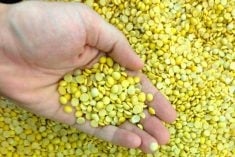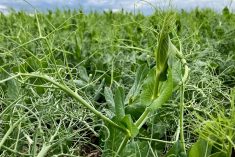MarketsFarm — The Foreign Agricultural Service of the U.S. Department of Agriculture (USDA) released its weekly Global Agricultural Information Network (GAIN) reports on Wednesday, including new information regarding oilseeds in India and Japan.
Oilseed production in India is projected to increase by one per cent at 42.1 million tonnes in 2022-23, according to FAS New Delhi. Soybean production will slightly decline 100,000 tonnes at 11.8 million, while rapeseed/canola production is slated to increase 300,000 tonnes at 11.1 million.
Those projections are based on the assumptions of near-normal yields, normal acreage for other commodities, sufficient water storage levels and the availability of fertilizers.
Read Also

U.S. grains: CBOT soybeans, corn, wheat fall in USDA data aftermath
Chicago grains took a dive on Friday, following a closely watched U.S. government crop report and the release of export data that could provide clues into Chinese buying.
The total oilseed crush projected for 2022-23 is 34.7 million tonnes, a 2.2 per cent increase from the previous marketing year. FAS New Delhi also predicts ending stocks to decline 16.4 per cent at 1.2 million tonnes.
Oil meal production will also increase by two per cent to 20.7 million tonnes due to greater animal feed demand and oilseed supply. Exports of oil meal are expected to increase 13 per cent at 3.7 million tonnes, while vegetable oil imports are projected to rise six per cent at 14.5 million tonnes.
Meanwhile in Japan, the loosening of COVID-19 restrictions has caused consumer demand to shift away from canola oil and toward soyoil.
The Japanese soybean crush is projected to total 2.45 million tonnes in 2022-23, the same amount as USDA’s total for 2021-22. However, the country’s rapeseed/canola crush is expected to decline 4.8 per cent at 2.17 million tonnes. These figures are due to less people cooking at home, which increased the use of canola oil at the start of the pandemic, and more people going out to eat at hotels and restaurants where soyoil is used.
Soybean imports are projected to decline by 7,000 tonnes at 3.27 million in 2022-23, while rapeseed/canola imports are predicted to be 2.17 million tonnes, 99,000 less than USDA’s total for 2021-22. The domestic soy meal crush is expected to be 2.45 million tonnes in 2022-23, same as USDA’s 2021-22 total, while the rapeseed/canola meal crush is expected to decline 110,000 tonnes at 2.17 million.
Imports of palm oil in Japan are projected to decline 30,000 tonnes at 620,000 for 2022-23. Rising prices have made power generation from palm stearin oil unprofitable, according to the report.














